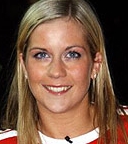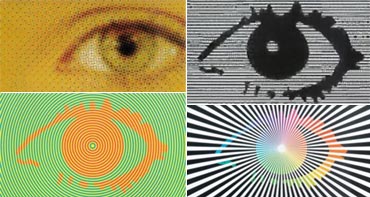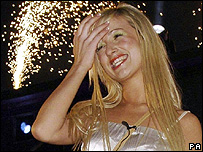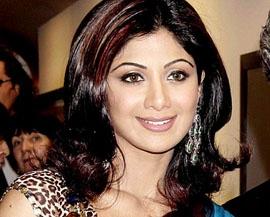Big Brother
(→Co-hosts) |
(Adding a history section, and other tidy-ups) |
||
| Line 10: | Line 10: | ||
== Co-hosts == | == Co-hosts == | ||
| - | [[Dermot O'Leary]] (''Big Brother's Little Brother'') 2001-2008, (''Big Brother's Big Brain'') 2006-2007 | + | [[Dermot O'Leary]] (''Big Brother's Little Brother'') 2001-2008, (''Teen Big Brother'') 2003, (''Big Brother's Big Brain'') 2006-2007 |
[[Russell Brand]] (''Big Brother's E4rum'' / ''Big Brother's Big Mouth'') 2004-2006 | [[Russell Brand]] (''Big Brother's E4rum'' / ''Big Brother's Big Mouth'') 2004-2006 | ||
| + | |||
| + | Jeff Brazier (''Big Brother Panto'') 2004-5 | ||
James Corden and Mathew Horne (''Big Brother's Big Mouth'') 2008 | James Corden and Mathew Horne (''Big Brother's Big Mouth'') 2008 | ||
| Line 28: | Line 30: | ||
Brighter Pictures (an Endemol company) for Channel 4, 18 May 2006 to present | Brighter Pictures (an Endemol company) for Channel 4, 18 May 2006 to present | ||
| - | ''Celebrity Big Brother'' 2001-2, 2005-7, 2009 | + | ''Celebrity Big Brother'' 2001-2, 2005-7, 2009 (2001 eviction shows and final on BBC1) |
''Teen Big Brother'' 2003 | ''Teen Big Brother'' 2003 | ||
| - | ''Big Brother: Celebrity Hijack'' | + | ''Big Brother Panto'' 20 December 2004 - 5 January 2005 |
| + | |||
| + | ''Big Brother: Celebrity Hijack'' 3 - 28 January 2008 | ||
</div> | </div> | ||
| Line 76: | Line 80: | ||
Good? Fun? Interesting? Yes. Scary and voyeuristic? Just a little bit. It's a game show and soap opera in one... but not as we know it. | Good? Fun? Interesting? Yes. Scary and voyeuristic? Just a little bit. It's a game show and soap opera in one... but not as we know it. | ||
| + | |||
| + | ==Big Brother: The Rise and Fall== | ||
| + | |||
| + | After being rejected out-of-hand by Sky 1, and turned down after a little thought by ITV, ''Big Brother'' had been commissioned for a nine-week run in 2000. This debut series had a slow start, but grew through word-of-mouth, cemented by the Nasty Nick incident, to turn into a major hit for Channel 4. It attracted an audience of young people, and an audience that didn't watch much other television. After the run was over, series producer Conrad Green encapsulated the tension at the heart of the show: | ||
| + | |||
| + | :"I as a producer can only intervene a certain amount; the people in the house can determine their fate only to a certain extent; and the audience controls things, but not completely. There's this strange triangle of control which makes people think they participate in it much more." | ||
| + | |||
| + | The series was renewed for 2001, giving [[Brian Dowling]] his first sniff of fame. Digital viewers were able to follow the show in far greater detail, with live streaming for much of the day on new channel E4. ''Big Brother's Little Brother'' also launched in 2001, propelling [[Dermot O'Leary]] towards megastardom. | ||
| + | |||
| + | The site at Three Mills only had planning permission for two years, and the show moved to a more permanent building in the Elstree studios from 2002. Endemol entered into a four-year contract with Channel 4, and that summer's edition would see the highest ratings, from the live first-night broadcast showing contestants entering the house. 2002's big idea was The Divide, splitting the contestants into Rich and Poor sides for half the run. Ten million people saw [[Kate Lawler]] win the series, but [[Jade Goody]] turned into the greatest star. | ||
| + | |||
| + | <div class="image">[[Image:Kate_lawler_headshot_small.jpg]]<br>''2002 champion Kate Lawler''</div> | ||
| + | |||
| + | 2003's series had a "back-to-basics" ethos, putting normal people in a less abnormal setting. Jon Tickle made a career out of his time on the show, and Cameron Stout's innocence charmed the viewers. Viewing figures were down on 2002. The series has retrospectively been dubbed "a bit boring", because it didn't have the bold characters and plot twists of the previous year. Channel 4's board of directors began to get a little uneasy about ''Big Brother'' during 2003, but worried that if they let it go, someone else would pick it up, and they needed the steady income. | ||
| + | |||
| + | For 2004, the producers quite deliberately set out to be "evil", with a set designed to be claustrophobic and intimidatory, to encourage pantomime villains and larger-than-life heroes. The atmosphere deteriorated quickly, resulting in a mass brawl during the third week. Security guards intervened, police were called, and all present would eventually be interviewed as part of a criminal investigation. If the housemates had been ceded more of Conrad Green's triangle in 2003, the producers were now doing all they could to influence the outcome. The final result was a clear victory for Nadia Almada, and ratings had increased slightly from the previous year, perhaps helped by the new digital spin-off ''EForum'' (renamed ''Big Brother's Big Mouth'' from January 2005.) | ||
| + | |||
| + | <div class="image">[[Image:Big Brother eyes.jpg]]<br>''The eye logo changed each year. Clockwise from top left: 2000, 2001, 2004, 2002''</div> | ||
| + | |||
| + | Two ''Big Brother'' spin-off series were made. Channel 4's education department shot ''Teen Big Brother: The Experiment'' during summer 2003. The intention was to explore topics in social education, such as methods of learning, and to debate matters like religion and gender stereotypes. In addition to airings in the morning schools' slot, the programmes were re-edited and shown as part of E4's evening schedule. The series is best remembered for the sex act between two of the competitors. The competitors voted for their own winner, Paul Brennan. A number of contestants from the first five series of ''Big Brother'' took part in a ''Big Brother Pantomime'' over Christmas 2004, a piece of filler for E4 that did not find a winner. | ||
| + | |||
| + | A short series of ''Celebrity Big Brother'' had taken place in March 2001, promoting the Comic Relief charity and won by comedian [[Jack Dee]]. Another Celebrity series was held in November 2002, won by pop singer Mark Owen. The latter series gave [[Les Dennis]] positive publicity after his well-publicised personal difficulties, and contestants [[Sue Perkins]] and Goldie would meet many years later on [[Maestro]]. ''Celebrity Big Brother'' became an annual fixture from January 2005, won that year by Bez from the Happy Mondays. The producers failed to ferment rows between Brigitte Nielsen and her former mother-in-law Jackie Stallone, and the abiding memory was of Germaine Greer walking out and criticising the production staff. | ||
| + | |||
| + | Channel 4 signed a new contract for 2005's summer show, allowing it to run for an eleventh week. The contestants were given various silly things to do, the show never quite caught the public's imagination, and was won by Anthony Hutton, who described himself as a ''Big Brother'' superfan. The new contract called for longer runs of both ''Celebrity'' and standard ''Big Brother''; 2006's celebrity series ran for three weeks, and was won by fake celebrity Chantelle Houghton; the iconic moment was George Galloway's impression of a cat. | ||
| + | |||
| + | <div class="image">[[Image:Houghton Chantelle.jpg]]<br>''Non-celebrity celebrity Chantelle Houghton''</div> | ||
| + | |||
| + | That year's public series ran for a full three months, and Pete Bennett proved most popular. It was a fractious series: two contestants withdrew before the first week was up, and someone who had been repeatedly rejected by the producers won a Golden Ticket promotion. Viewing figures were level with the previous year, helped by Channel 4 scheduling episodes against the football world cup and back-to-back with editions of [[Deal or No Deal]]. Towards the end of the game, four contestants who had been previously evicted were allowed back into the game; the premium-rate telephone regulator would later find that Channel 4 had misled viewers. Fans and the tabloid press began to turn against the programme, with the producers accused in some quarters of concentrating on what would make the most interesting show for the next night and ignoring the greater game. | ||
| + | |||
| + | ''Celebrity Big Brother'' 2007 was the most controversial run of the series. Indeed, when measured in terms of complaints to the media regulator, it was the most controversial programme ever, after remarks by [[Jade Goody]] against Shilpa Shetty turned into the most almighty row about racism. Though ''Big Brother'' had always been popular amongst young people, it was remarkably unpopular for older viewers - the audience of over-50s was negligible. While politicians and opinion-formers had heard ''about'' the show, most of them had never actually ''seen'' it. The talking heads released pent-up vitriol against ''Big Brother'', against Channel 4, against television they didn't understand, and it all turned very ugly. Regulator OFCOM received many thousands of complaints, the programme's sponsor withdrew, and Shetty won the public vote. Though viewing figures rose to a peak of 8.8 million, it wasn't the press Channel 4 wanted. | ||
| + | |||
| + | <div class="image">[[Image:Shetty Shilpa.jpg]]<br>''Shilpa Shetty became a household name afer winning ''Celebrity Big Brother</div> | ||
| + | |||
| + | 2007's regular series again lasted for three months; eleven female housemates entered at the beginning, another thirteen people entered and left until Brian Belo was declared the winner. One person was thrown out for using a racial epithet, ratings were the lowest in the show's history, and - after January's troubles - the franchise looked to be in serious trouble. Rather than run another Celebrity edition at the start of 2008, ''Big Brother Celebrity Hijack'' had a number of young people confronted by various celebrities playing the role of Big Brother. The programme aired exclusively on the digital channel E4, and was won by politician John Loughton. | ||
| + | |||
| + | By summer 2008, coverage on E4 was much reduced; rather than running for twenty hours per day, there was now barely ten hours of ''Big Brother'' programming on the digital channel, and most of that was overnight. For the first time in the show's history, there was no live web stream. Rachel Rice won the public vote, and gimmicks included a "Heaven and Hell" split. Dermot O'Leary left ''Little Brother'' with [[George Lamb]] making it his home, ''Big Mouth'' had a series of guest hosts, and viewing figures for the main show continued to fall, with barely 3 million seeing most shows. ''Celebrity'' returned in 2009, with a strong whiff of contractual obligation permeating the programme. Even while the show was airing, we couldn't tell you what was going on, or even who (other than winner [[Ulrika Jonsson]]) was in it. The press didn't care, the viewers didn't care. | ||
== Key moments == | == Key moments == | ||
| Line 108: | Line 148: | ||
2005 Mark Berry (a.k.a. Bez from Manchester band ''The Happy Mondays'')<br> | 2005 Mark Berry (a.k.a. Bez from Manchester band ''The Happy Mondays'')<br> | ||
2006 Chantelle Houghton (member of girl group ''Kandyfloss-with-a-K'' * ) <br> | 2006 Chantelle Houghton (member of girl group ''Kandyfloss-with-a-K'' * ) <br> | ||
| - | 2007 Shilpa Shetty | + | 2007 Shilpa Shetty<br> |
| + | 2009 [[Ulrika Jonsson]] | ||
''Teen Big Brother: The Experiment''<br> | ''Teen Big Brother: The Experiment''<br> | ||
Revision as of 10:24, 24 January 2009

Contents |
Host
Marcus Bentley (voiceover)
Davina McCall (launch/eviction host)
Co-hosts
Dermot O'Leary (Big Brother's Little Brother) 2001-2008, (Teen Big Brother) 2003, (Big Brother's Big Brain) 2006-2007
Russell Brand (Big Brother's E4rum / Big Brother's Big Mouth) 2004-2006
Jeff Brazier (Big Brother Panto) 2004-5
James Corden and Mathew Horne (Big Brother's Big Mouth) 2008
George Lamb (Big Brother's Little Brother) 2008-
Zezi Ifore (Big Brother's Little Brother) 2008
Jack Whitehall (Big Brother's Big Mouth) 2009
Broadcast
Endemol UK for Channel 4, 18 July 2000 to 12 August 2005
Brighter Pictures (an Endemol company) for Channel 4, 18 May 2006 to present
Celebrity Big Brother 2001-2, 2005-7, 2009 (2001 eviction shows and final on BBC1)
Teen Big Brother 2003
Big Brother Panto 20 December 2004 - 5 January 2005
Big Brother: Celebrity Hijack 3 - 28 January 2008
Synopsis
Well, it's been a hit all around the world (namely: Holland) and now it's our turn to play the voyeur. Ooh-er! In George Orwell's book Nineteen Eighty-Four, Big Brother was watching you. Now, you can watch Big Brother. Deeply profound, we know.
We also know that this isn't a format for everybody. We fully understand that there are people who will find it dull - after all it is just ten people in a house, but at the same time it is absolutely compelling.
So then, what does the game entail? Ten people are locked away in a specially designed prefab hut in a secret location (for which read: the 3 Mills studio complex in Bow, East London) without any contact with the outside world. Every week, each member of the house nominates the two people they would most like evicted. The two or more people with the most votes are then offered to the public who decide who they want to kick out in a phone vote.
The big thing is the eviction - and they need to be cruel to be kind because the last person left at the end of the series wins £70,000. The two potential evictees are told their fate by Big Brother before the public get three days to vote on the decision. It's this in-between time that causes a lot of the tension between the housemates - you've been nominated because you were liked the least, not a pleasant feeling is it? And what if you win the public vote and are allowed to stay? You've still been shown a yellow card. Nasty but gripping stuff.
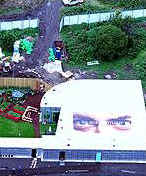 Exterior shot of the Big Brother House
Exterior shot of the Big Brother HouseOf course, there's a bit more to it than that. The biggest thing is that the entire house is wired up with cameras and microphones, so there's nowhere to hide, and we can hear everything you're saying and see everything - and we mean everything - you're doing. The only place of privacy is the diary room, where there's a camera in a soundproof environment for you to speak your mind to Big Brother. To our disappointment, Big Brother wasn't a particular voice - it was just the dull, drab tones of whichever director was on duty at the time. You'd think that if you spend £4 million on a series, you'd spend a few extra thousand on actors or even a computerised speech simulator.
Most days there is a half-hour or hour show dedicated to what's happened. More interestingly, you can (quite literally) catch them at it by logging into the website. You can only log into 5 cameras from the web-site, but given that they are all in prominent places you can still see everything you want to see. In a good move, you can't log onto the shower and toilet ones - but that hasn't stopped them being used in the telly show. This isn't a show for prudes really as anything interesting that does happen will get shown.
Each week Big Brother sets the housemates a task to occupy them. Every day someone stays in the Big Brother House, they earn £1.50. All this goes into a pot at the end of the week in order to buy food and supplies - although the players have to use some of that cash to make and bake their own bread and grow their own vegetables (the chickens are included for free). Most of it goes on alcohol though, but as our guinea pigs learnt to their cost, perhaps they should spend more on proper supplies like food and toilet paper (which they hilariously ran out of during the first week and Big Brother wouldn't give them any more) and less on getting drunk - indeed the new tactic is to buy cider because it's cheap. Anyway, for each task the housemates can gamble up to 50% of their pocket money. If they win then they'll get more money in the next weeks, if they lose then they lose the cash.
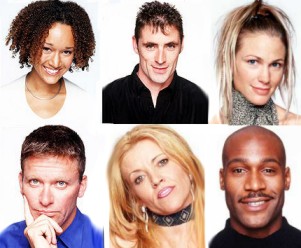 Some of the Big Brother lab rats: (clockwise, from top-left) Melanie, Thomas, Sada, Darren, Caroline, Nicholas
Some of the Big Brother lab rats: (clockwise, from top-left) Melanie, Thomas, Sada, Darren, Caroline, NicholasThe first task was to have everybody make a clay bowl and mug and if more than three objects cracked when they were cooked then they lost the challenge. To help them, they were given a potters wheel and lots of clay. Sadly, they failed but because Big Brother isn't cruel (much), they gave the players a giant crate of fruit as a consolation prize - makes a difference from a Blankety Blank chequebook and pen - but sadly the cash was gone. Big Brother also showed his (her? its?) human sides by allowing treats such as the video of one participant's child's birthday to be the shown, and for another participant to receive champers and their choice of board game for their birthday.
It has to be said that, in their infinite wisdom, the producers have chosen an odd crowd of people. None of them are particularly old, and therefore haven't experienced very much. This is not so much a microcosm, more a zoo where only the more curious mutations of the human species have been cooped up. Of what they have experienced, nearly all of it revolves around the bizarre, rather than anything particularly worthy - although, to be fair, as the series trundles on this is becoming less so.
The website of the TV show tries to re-create the emotionless technological style of the show. In some ways it's very good, because you can keep up to date with all the latest news and spy on the housemates (assuming you can get the web cam applet to work). However, you can't help feeling that the project has done the web sponsor more harm than good - at one point it took up to a day to register for the site, the text was repeating itself in certain places, and it was possible for the site to make your browser crash. Still, it looks nice.
As per usual in programmes these days, there's a hardcore dance theme-tune, courtesy of Paul Oakenfold, which was also released as part of a Big Brother album. Annoyingly, the links between clips of VT are bolted together by the worst squeaky white-noise effect you've ever heard.
We also wonder whether the whole package fits together. At the beginning, we have a documentary. A few shows in and now we get added commentary from psychological experts. And when the evictions start, we get live talk shows with Davina McCall. And then there's that Internet page too.
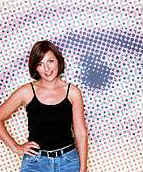 Host (for some of the time, anyway) Davina McCall
Host (for some of the time, anyway) Davina McCallSo then, this isn't so much a game show as a 'democratic televised competition (TM)' that relies on having the right mix of players. Whether the mix is correct is somewhat open to debate - younger viewers will lap it up, but in general audience terms it's hard to see where the attraction will be. In the original Holland show, one of the finalists was a man significantly older than the other 20/30-something participants - why did Channel 4 decide to exclude an older age group from the proceedings? Even the girls themselves in the UK version mentioned this.
Good? Fun? Interesting? Yes. Scary and voyeuristic? Just a little bit. It's a game show and soap opera in one... but not as we know it.
Big Brother: The Rise and Fall
After being rejected out-of-hand by Sky 1, and turned down after a little thought by ITV, Big Brother had been commissioned for a nine-week run in 2000. This debut series had a slow start, but grew through word-of-mouth, cemented by the Nasty Nick incident, to turn into a major hit for Channel 4. It attracted an audience of young people, and an audience that didn't watch much other television. After the run was over, series producer Conrad Green encapsulated the tension at the heart of the show:
- "I as a producer can only intervene a certain amount; the people in the house can determine their fate only to a certain extent; and the audience controls things, but not completely. There's this strange triangle of control which makes people think they participate in it much more."
The series was renewed for 2001, giving Brian Dowling his first sniff of fame. Digital viewers were able to follow the show in far greater detail, with live streaming for much of the day on new channel E4. Big Brother's Little Brother also launched in 2001, propelling Dermot O'Leary towards megastardom.
The site at Three Mills only had planning permission for two years, and the show moved to a more permanent building in the Elstree studios from 2002. Endemol entered into a four-year contract with Channel 4, and that summer's edition would see the highest ratings, from the live first-night broadcast showing contestants entering the house. 2002's big idea was The Divide, splitting the contestants into Rich and Poor sides for half the run. Ten million people saw Kate Lawler win the series, but Jade Goody turned into the greatest star.
2003's series had a "back-to-basics" ethos, putting normal people in a less abnormal setting. Jon Tickle made a career out of his time on the show, and Cameron Stout's innocence charmed the viewers. Viewing figures were down on 2002. The series has retrospectively been dubbed "a bit boring", because it didn't have the bold characters and plot twists of the previous year. Channel 4's board of directors began to get a little uneasy about Big Brother during 2003, but worried that if they let it go, someone else would pick it up, and they needed the steady income.
For 2004, the producers quite deliberately set out to be "evil", with a set designed to be claustrophobic and intimidatory, to encourage pantomime villains and larger-than-life heroes. The atmosphere deteriorated quickly, resulting in a mass brawl during the third week. Security guards intervened, police were called, and all present would eventually be interviewed as part of a criminal investigation. If the housemates had been ceded more of Conrad Green's triangle in 2003, the producers were now doing all they could to influence the outcome. The final result was a clear victory for Nadia Almada, and ratings had increased slightly from the previous year, perhaps helped by the new digital spin-off EForum (renamed Big Brother's Big Mouth from January 2005.)
Two Big Brother spin-off series were made. Channel 4's education department shot Teen Big Brother: The Experiment during summer 2003. The intention was to explore topics in social education, such as methods of learning, and to debate matters like religion and gender stereotypes. In addition to airings in the morning schools' slot, the programmes were re-edited and shown as part of E4's evening schedule. The series is best remembered for the sex act between two of the competitors. The competitors voted for their own winner, Paul Brennan. A number of contestants from the first five series of Big Brother took part in a Big Brother Pantomime over Christmas 2004, a piece of filler for E4 that did not find a winner.
A short series of Celebrity Big Brother had taken place in March 2001, promoting the Comic Relief charity and won by comedian Jack Dee. Another Celebrity series was held in November 2002, won by pop singer Mark Owen. The latter series gave Les Dennis positive publicity after his well-publicised personal difficulties, and contestants Sue Perkins and Goldie would meet many years later on Maestro. Celebrity Big Brother became an annual fixture from January 2005, won that year by Bez from the Happy Mondays. The producers failed to ferment rows between Brigitte Nielsen and her former mother-in-law Jackie Stallone, and the abiding memory was of Germaine Greer walking out and criticising the production staff.
Channel 4 signed a new contract for 2005's summer show, allowing it to run for an eleventh week. The contestants were given various silly things to do, the show never quite caught the public's imagination, and was won by Anthony Hutton, who described himself as a Big Brother superfan. The new contract called for longer runs of both Celebrity and standard Big Brother; 2006's celebrity series ran for three weeks, and was won by fake celebrity Chantelle Houghton; the iconic moment was George Galloway's impression of a cat.
That year's public series ran for a full three months, and Pete Bennett proved most popular. It was a fractious series: two contestants withdrew before the first week was up, and someone who had been repeatedly rejected by the producers won a Golden Ticket promotion. Viewing figures were level with the previous year, helped by Channel 4 scheduling episodes against the football world cup and back-to-back with editions of Deal or No Deal. Towards the end of the game, four contestants who had been previously evicted were allowed back into the game; the premium-rate telephone regulator would later find that Channel 4 had misled viewers. Fans and the tabloid press began to turn against the programme, with the producers accused in some quarters of concentrating on what would make the most interesting show for the next night and ignoring the greater game.
Celebrity Big Brother 2007 was the most controversial run of the series. Indeed, when measured in terms of complaints to the media regulator, it was the most controversial programme ever, after remarks by Jade Goody against Shilpa Shetty turned into the most almighty row about racism. Though Big Brother had always been popular amongst young people, it was remarkably unpopular for older viewers - the audience of over-50s was negligible. While politicians and opinion-formers had heard about the show, most of them had never actually seen it. The talking heads released pent-up vitriol against Big Brother, against Channel 4, against television they didn't understand, and it all turned very ugly. Regulator OFCOM received many thousands of complaints, the programme's sponsor withdrew, and Shetty won the public vote. Though viewing figures rose to a peak of 8.8 million, it wasn't the press Channel 4 wanted.
2007's regular series again lasted for three months; eleven female housemates entered at the beginning, another thirteen people entered and left until Brian Belo was declared the winner. One person was thrown out for using a racial epithet, ratings were the lowest in the show's history, and - after January's troubles - the franchise looked to be in serious trouble. Rather than run another Celebrity edition at the start of 2008, Big Brother Celebrity Hijack had a number of young people confronted by various celebrities playing the role of Big Brother. The programme aired exclusively on the digital channel E4, and was won by politician John Loughton.
By summer 2008, coverage on E4 was much reduced; rather than running for twenty hours per day, there was now barely ten hours of Big Brother programming on the digital channel, and most of that was overnight. For the first time in the show's history, there was no live web stream. Rachel Rice won the public vote, and gimmicks included a "Heaven and Hell" split. Dermot O'Leary left Little Brother with George Lamb making it his home, Big Mouth had a series of guest hosts, and viewing figures for the main show continued to fall, with barely 3 million seeing most shows. Celebrity returned in 2009, with a strong whiff of contractual obligation permeating the programme. Even while the show was airing, we couldn't tell you what was going on, or even who (other than winner Ulrika Jonsson) was in it. The press didn't care, the viewers didn't care.
Key moments
The whole "Nasty Nick" saga in BB1.
New housemates always getting evicted at the earliest opportunity.
A prolonged row in the 2007 celebrity series sparked a national debate on racism, and resulted in Channel 4 having to apologise on air. Official adjudication.
If you're looking for the match reports that used to be here, they're now on their own page.
Inventor
Based on Jan de Mol's Dutch show.
Champions
2000 Craig Phillips
2001 Brian Dowling
2002 Kate Lawler
2003 Cameron Stout
2004 Nadia Almada
2005 Anthony Hutton
2006 Pete Bennett
2007 Brian Belo
2008 Rachel Rice
Celebrity Big Brother
2001 Jack Dee
2002 Mark Owen
2005 Mark Berry (a.k.a. Bez from Manchester band The Happy Mondays)
2006 Chantelle Houghton (member of girl group Kandyfloss-with-a-K * )
2007 Shilpa Shetty
2009 Ulrika Jonsson
Teen Big Brother: The Experiment
2003 Paul Brennan
Big Brother: Celebrity Hijack
2008 John Loughton
*Or so she would have you believe. Chantelle was not a celebrity at all, but was put into the house anyway under orders to pretend to be a celebrity, and in so doing, earn celebrity status (do you see?). The real celebrities in the house didn't spot the bluff, and in a task ranked her more famous than two of her own, so Chantelle was allowed to remain in the house and went on to win the series.
Theme music
"Big Brother UK TV Theme" by Paul Oakenfold and Andy Gray working under the name ElementFour. Despite the somewhat prosaic title, it was a pretty big hit single back in 2000, reaching number 4 in the charts in September. A Big Brother album is also available (see below).
Trivia
Perhaps unsurprisingly, the 2002 final got Channel 4's biggest non-film audience ever, with ten million viewers tuning in to see Kate Lawler become the first female winner.
When John de Mol was creating the original Big Brother in The Netherlands, it went under the codename The Golden Cage. This title wasn't deemed suitable for the final show, but it has resurfaced as a similar but open ended show (involving contestants living like millionaires but with little contact with the outside world, contestants stay on until they leave on their own free will, last one standing wins the mansion and a huge cash sum) which began in The Netherlands in 2006 and is being sold around the world.
Merchandise
Also The Offical Unseen Story (tie-in book for series 2)
Inside Big Brother (tie-in book for series 3)
Big Brother 4: Up Close And Personal (tie-in book for series 4)
Big Brother 6 (tie-in book)
Big Brother: The Inside Story (written by former contestants)
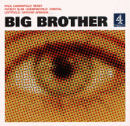 Big Brother - the Album Double CD - includes the famous theme music
Big Brother - the Album Double CD - includes the famous theme musicPC game
The Babe's Bible - book co-written with Sada Walkington (former BB contestant)
How to be a Right Bastard - book by Nick Bateman (former BB contestant)
Billion Dollar Game - book by Peter Bazalgette. An insider's view of the development of the show from its initial conception to the screen.
See also
Detailed reviews of the first two series
Weaver's Week reports:
BB2: Week 1 | Week 2 | Week 3 | Week 4 | Week 7 | Week 8 | Week 9 | Week 10 | Analysis
BB3: Week 1 | Week 2 | Week 3 | Week 4 | Week 5 | Week 6 | Week 7 | Week 8 | Week 9 | Postscript
BB4: Week 1 | Week 2 | Week 3 | Week 4 | Week 5 | Week 6 | Week 7 | Week 8 | Week 9
BB5: Week 1 | Week 2 | Week 3 | Week 4 | Week 5 | Week 6 | Week 7 | Week 8 | Week 9 | Postscript
BB6 (end-of-series analysis)
BB7 (end-of-series analysis)
Celebrity BB: Series 1 | Series 2: Part 1 | Part 2 | Series 3
Book reviews: Dean O'Loughlin (2004) | Narinder Kaur (2007)
Web links
Off The Telly's Big Brother reviews

